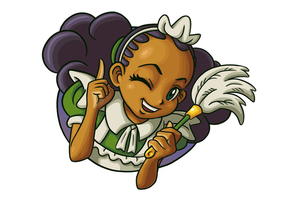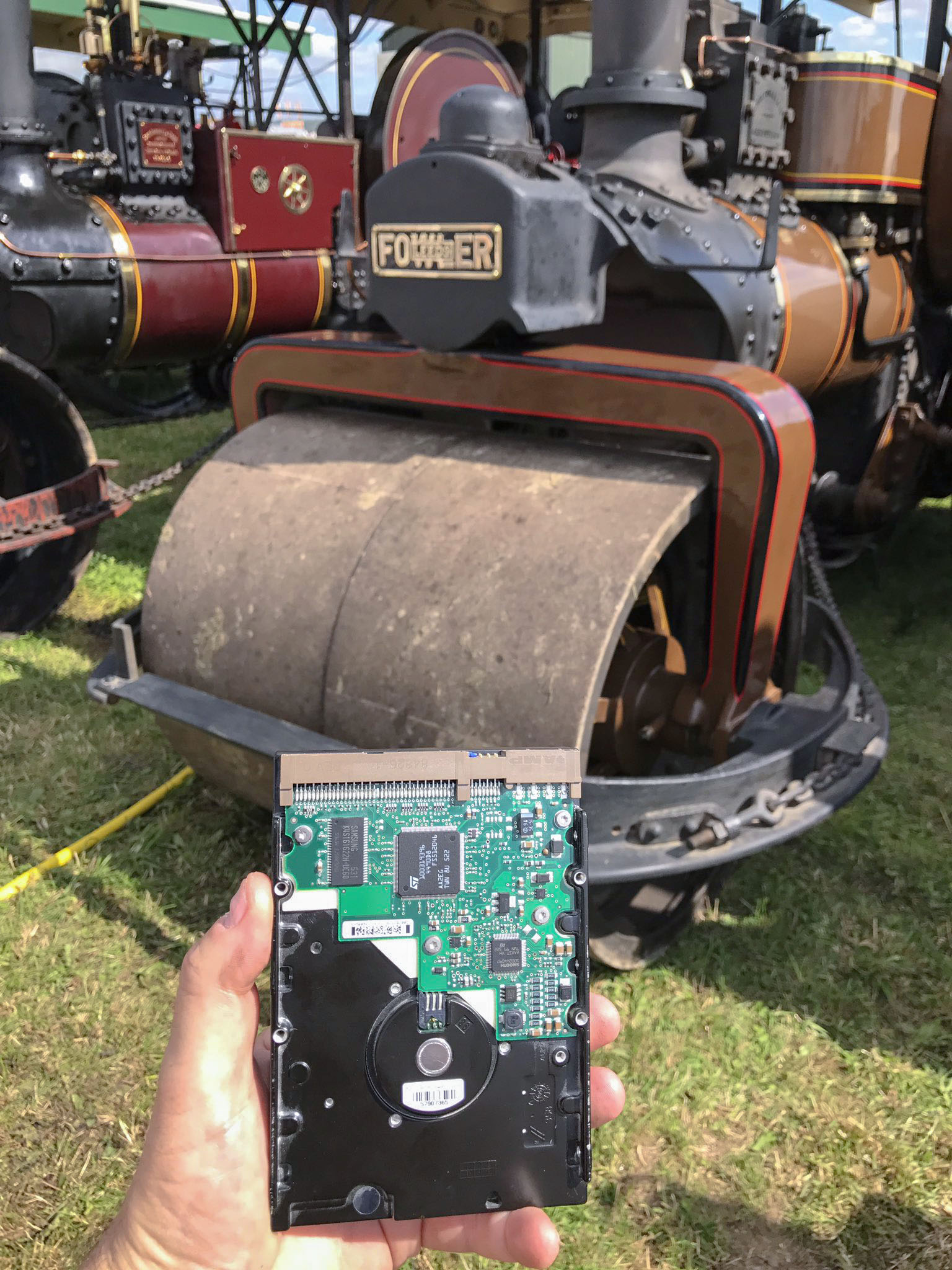Terry Pratchett’s Hard Drive (lost destroyed hard drive of unfinished novels from English author; 2017): Difference between revisions
(editing second paragraph, adding quote box) |
m (fixed bold text runover) |
||
| Line 15: | Line 15: | ||
== Early career == | == Early career == | ||
Terry Pratchett's career as an author began at the age of 12 when his short story '''Business Rivals''<nowiki/>' was published in the 1962 issue of ''Technical Cygnett''. After some editing and expansion, it was republished as '[https://archive.org/details/Science_Fantasy_v20n60_1963-08_SLiV/page/n67/mode/2up ''The Hades Business'']' in the August issue of ''Science Fantasy'' 1963.<ref>https://colinsmythe.co.uk/terry-pratchett/</ref> In 1965 Pratchett left school to pursue a career in journalism, beginning work at newspaper '[https://en.wikipedia.org/wiki/Bucks_Free_Press Bucks Free Press]' where while working and studying he continued to write. Publishing 60 short children's stories under the pseudonym Uncle Jim.<ref>https://colinsmythe.co.uk/terry-pratchett/</ref> Around 1968 while conducting an interview with the the director of a publishing company he mentioned his writing and pitched a book he had planned. The interviewee was impressed by his work and passed it on to his colleague, [https://en.wikipedia.org/wiki/Colin_Smythe Colin Smythe] of [https://colinsmythe.co.uk/ Colin Smythe Limited]. Smythe approved his work for publication<ref>https://colinsmythe.co.uk/terry-pratchett/</ref> and in 1971 his first published novel [https://en.wikipedia.org/wiki/The_Carpet_People ''The Carpet People''] was released. | Terry Pratchett's career as an author began at the age of 12 when his short story '''Business Rivals''<nowiki/>' was published in the 1962 issue of ''Technical Cygnett''. After some editing and expansion, it was republished as '[https://archive.org/details/Science_Fantasy_v20n60_1963-08_SLiV/page/n67/mode/2up ''The Hades Business'']' in the August issue of ''Science Fantasy'' 1963.<ref>https://colinsmythe.co.uk/terry-pratchett/</ref> In 1965 Pratchett left school to pursue a career in journalism, beginning work at newspaper '[https://en.wikipedia.org/wiki/Bucks_Free_Press Bucks Free Press]' where while working and studying he continued to write. Publishing 60 short children's stories under the pseudonym Uncle Jim.<ref>https://colinsmythe.co.uk/terry-pratchett/</ref> Around 1968 while conducting an interview with the the director of a publishing company he mentioned his writing and pitched a book he had planned. The interviewee was impressed by his work and passed it on to his colleague, [https://en.wikipedia.org/wiki/Colin_Smythe Colin Smythe] of [https://colinsmythe.co.uk/ Colin Smythe Limited]. Smythe approved his work for publication<ref>https://colinsmythe.co.uk/terry-pratchett/</ref> and in 1971 his first published novel [https://en.wikipedia.org/wiki/The_Carpet_People ''The Carpet People''] was released. | ||
== Lost stories == | == Lost stories == | ||
Before Pratchett found success with his '''Discworld''' series. He published thirty<ref>https://colinsmythe.co.uk/terry-pratchett/</ref> short stories in the [https://en.wikipedia.org/wiki/Western_Daily_Press Western Daily Press] - a newspaper he had worked at from 1970 to 1972. Published under a pseudonym, they were it not for Pratchett devotee Chris Lawrence may have remained forgotten. Lawrence had collected the story '''The Quest for the Keys'' | Before Pratchett found success with his '''Discworld''' series. He published thirty'''''<ref>https://colinsmythe.co.uk/terry-pratchett/</ref>'' '''short stories in the [https://en.wikipedia.org/wiki/Western_Daily_Press Western Daily Press]''''' - '''''a newspaper he had worked at from 1970 to 1972. Published under a pseudonym, they were it not for Pratchett devotee Chris Lawrence may have remained forgotten. Lawrence had collected the story ''<nowiki/>'The Quest for the Keys''' serialized over several months in the Western Daily Press under the authors usual byline. In 2022, finding it undocumented elsewhere he brought it to the attention of Terry Pratchett's now long time publisher Colin Smythe who was completely unaware of it's existence. For the last 40 years it has only existed in it's complete form as a collection of newspaper clippings framed on the wall of Lawrence's house. Sensing the possibility of more lost stories, Lawrence and his wife went to the British Newspaper Archive and began searching for all fiction in older issues of the Western Daily Press. It was eventually determined via similarities in writing that thirty works by Patrick Kearns were actually by Pratchett.<ref>https://www.bigissue.com/culture/books/terry-pratchett-a-stroke-of-the-pen-the-lost-stories/</ref> Kearns it turned out, was Pratchett's mothers maiden name. Happily, twenty of those short stories were republished in 2023 in the collection '[https://wiki.lspace.org/Book:A_Stroke_of_the_Pen ''A Stroke of the Pen: The Lost Stories'']'. | ||
== Alzheimer's diagnosis and posthumous destruction of work == | == Alzheimer's diagnosis and posthumous destruction of work == | ||
Revision as of 09:40, 23 February 2024
Terry Pratchetts hard drive, pre-destruction
Status: Lost
Comment: Unrecoverable, no other known copies
Sir Terry Pratchett (1948-2015) was a science fiction and fantasy author best known for his long running comic-fantasy series Discworld which ran for a total of 41 books between 1983 and his death in 2015. In 2017 a hard drive containing his unfinished works were destroyed by a steamroller. In 2022 a number lost short stories from earlier in his career and published under a pseudonym resurfaced.
Early career
Terry Pratchett's career as an author began at the age of 12 when his short story 'Business Rivals' was published in the 1962 issue of Technical Cygnett. After some editing and expansion, it was republished as 'The Hades Business' in the August issue of Science Fantasy 1963.[1] In 1965 Pratchett left school to pursue a career in journalism, beginning work at newspaper 'Bucks Free Press' where while working and studying he continued to write. Publishing 60 short children's stories under the pseudonym Uncle Jim.[2] Around 1968 while conducting an interview with the the director of a publishing company he mentioned his writing and pitched a book he had planned. The interviewee was impressed by his work and passed it on to his colleague, Colin Smythe of Colin Smythe Limited. Smythe approved his work for publication[3] and in 1971 his first published novel The Carpet People was released.
Lost stories
Before Pratchett found success with his Discworld' series. He published thirty[4] short stories in the Western Daily Press - a newspaper he had worked at from 1970 to 1972. Published under a pseudonym, they were it not for Pratchett devotee Chris Lawrence may have remained forgotten. Lawrence had collected the story 'The Quest for the Keys serialized over several months in the Western Daily Press under the authors usual byline. In 2022, finding it undocumented elsewhere he brought it to the attention of Terry Pratchett's now long time publisher Colin Smythe who was completely unaware of it's existence. For the last 40 years it has only existed in it's complete form as a collection of newspaper clippings framed on the wall of Lawrence's house. Sensing the possibility of more lost stories, Lawrence and his wife went to the British Newspaper Archive and began searching for all fiction in older issues of the Western Daily Press. It was eventually determined via similarities in writing that thirty works by Patrick Kearns were actually by Pratchett.[5] Kearns it turned out, was Pratchett's mothers maiden name. Happily, twenty of those short stories were republished in 2023 in the collection 'A Stroke of the Pen: The Lost Stories'.
Alzheimer's diagnosis and posthumous destruction of work
In 2007 while on tour in America, Pratchett announced that he had suffered a stroke. Unfortunately further medical diagnosis led to the conclusion that he had a "very rare form of early onset Alzheimer's"[6] which he described as "An Embuggerance"[7]. From this point onward editing became steadily more difficult. To get around this he began dictating his work to assistant Rob Wilkins and using a voice recognition program. [8] Despite the onset of Alzheimer's he also continued to play video games with the help of a specially designed mod. Pratchett continued to publish at a slower pace as his disease progressed finishing four more books, two documentaries and many other projects over the next few years. In March 2015 he died as a result of complications from Alzheimer's, with his final novel 'The Shepherd's Crown' being released posthumously.
Steamroller finale
In 2017 his long time assistant Rob Wilkins announced via Twitter that he would be destroying Pratchett's computers hard drive which contained all extant unfinished work, according to specific instructions.[9] Reportedly there was up to "ten unpublished novels" on the hard drive.[10] Neil Gaiman, his long time friend and co-author of Good Omens is quoted as saying he wanted
"Whatever he was working on at the time of his death to be taken out along with his computers, to be put in the middle of a road and for a steamroller to steamroll over them all."[11]
On the 25th of August 2017 at the Great Dorset Steam Fair, the hard drive was destroyed by a steamroller known as Lord Jericho. Images of the process can be seen here. According to Richard Henry curator of Salisbury Museum "The steamroller totally annihilated the stone blocks underneath but the hard drive survived better than expected so we put it in a stone crusher afterwards which I think probably finally did it in".[12] Afterwards, Rob Wilkins tweeted a photo of the destroyed hard drive with the caption "There goes the browsing history".[13]
There are no other known copies of any of Pratchett's incomplete work, nor has anything apart from rumours circulated about their content. Terry Pratchett's daughter Rhianna Pratchett has stated in reply to a fans question "No I don't intend on writing more Discworld novels, or giving anyone else permission to do so."[14] Due to the authors family, publisher and estate taking a strong stance that no further original works are published. It is extremely unlikely the incomplete stories will ever surface.
References
- ↑ https://colinsmythe.co.uk/terry-pratchett/
- ↑ https://colinsmythe.co.uk/terry-pratchett/
- ↑ https://colinsmythe.co.uk/terry-pratchett/
- ↑ https://colinsmythe.co.uk/terry-pratchett/
- ↑ https://www.bigissue.com/culture/books/terry-pratchett-a-stroke-of-the-pen-the-lost-stories/
- ↑ https://discworld.com/an-embuggerance/
- ↑ https://discworld.com/an-embuggerance/
- ↑ https://web.archive.org/web/20130115160514/http://www.paulkidby.com/biography/terrypratchett.html
- ↑ https://twitter.com/terryandrob/status/901028525200879616?t=cggqh3DmLBeOa0bl5YCNlg
- ↑ https://twitter.com/terryandrob/status/902853175627141120?lang=en
- ↑ https://www.thetimes.co.uk/article/pratchett-wanted-final-work-destroyed-by-a-steamroller-5vdlkcf6wj8
- ↑ https://www.bbc.com/news/uk-england-dorset-41093066
- ↑ https://twitter.com/terryandrob/status/901037198665019392
- ↑ https://twitter.com/rhipratchett/status/606868506408308737

